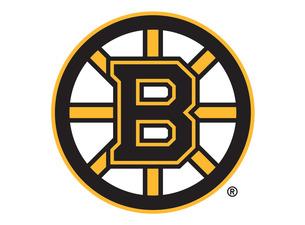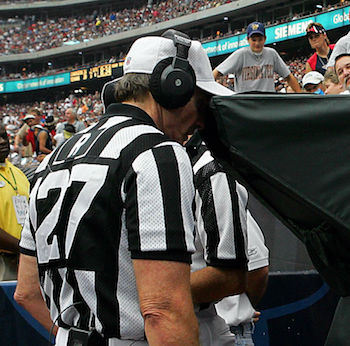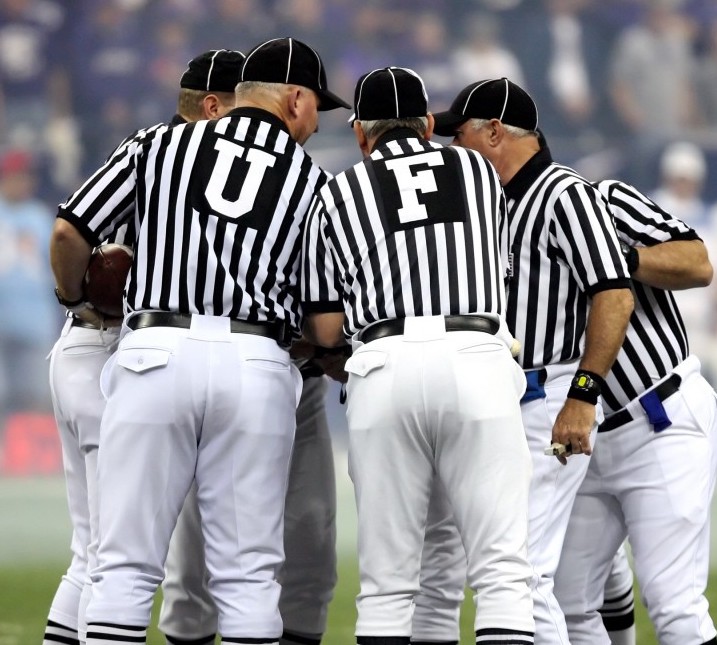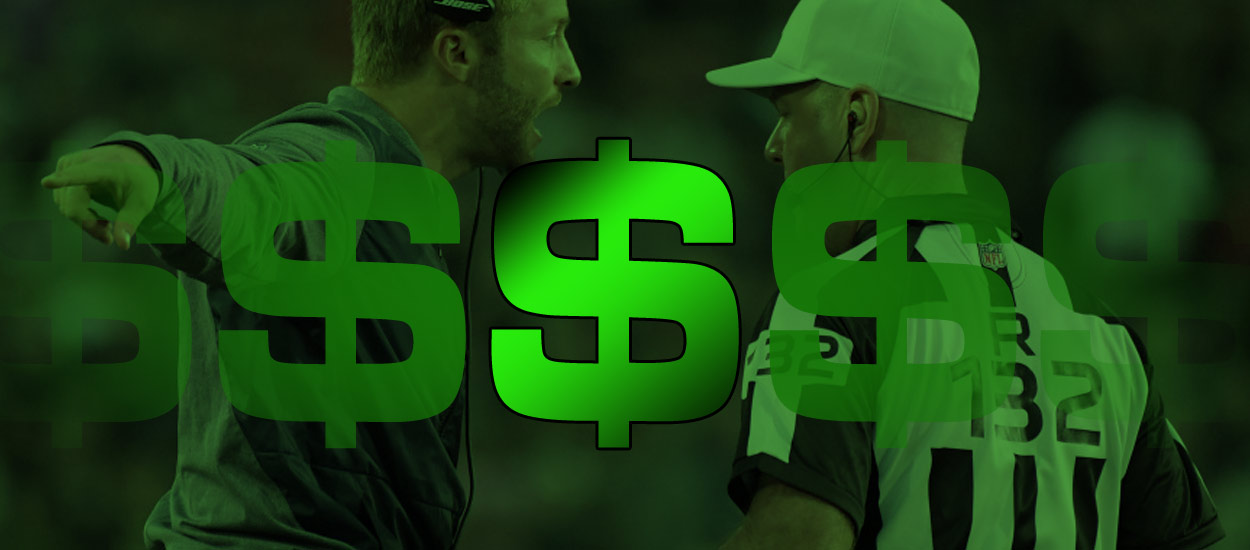Leagues need a lot more effort on their part to ensure that the officiating in games is accurate
For the longest time major sports leagues pushed back against legal sports betting fearing it could harm the integrity of games. Based on comments by league commissioners over the years it appears they were worried about another Pete Rose scenario, where players or coaches wager on their own sport, as well as players either not trying or colluding to ensure the point spread isn’t covered or even to lose meaningless games in an effort to make some quick money. The commissioners’ stated that they owed it to fans to ensure that all games were completely on the up and up and were concerned that questionable outcomes would be attributed to cheating as a result of betting. What the leagues never really expressed a concern about, at least publicly, was dishonest officials. This was even the case after the Tim Donaghy scandal a few years back, when Donaghy colluded with underground bookies to decide games. Of course, officials are hired by and work directly for the leagues, so the last thing the leagues would want to imply is that they could be a problem.
In the last few years, however, the leagues have softened their stance towards sports betting. It started with Adam Silver, the commissioner of the NBA, and expanded to other leagues like the NHL and Major League Baseball, who realized they could profit from sports betting too. The first foray into sports betting was when teams partnered with FanDuel and DraftKings to get advertising money in exchange for promoting daily fantasy sports, but the gates really opened up with the repeal of PASPA last year, resulting in all leagues except the NCAA agreeing to support legalized sports wagering, although with a catch. They have asked for an integrity fee in exchange for their support and for extra work on their part that will be required to ensure game fairness and integrity. Originally the leagues asked for 1% of all bets as an integrity fee, although they seem prepared to accept 0.25% that states like Indiana and Illinois have said they would pay.
I was curious what exactly entails integrity, so I checked the English dictionary and thesaurus and three common principles that describe integrity are fairness, accuracy and accountability. In better words, for the leagues to guarantee that games are on the up and up, they have to ensure that there is no bias or favoritism by the referees or other league officials, that the results reflect game play and when there are questions as to the fairness of games, the leagues do everything in their power to correct the wrongs and punish officials who have broken any rules. For anyone following the playoffs the last couple of years they have to question whether the leagues have met the mandate. Let’s look at examples where leagues have failed in each respect:
Fairness and Bias
There have been a lot of questions as to whether officials give the benefit of the doubt to superstar players, like Tom Brady or Lebron James, and popular teams, like the New England Patriots, Dallas Cowboys or Golden State Warriors, and while many people will try to show that is the case, it’s all speculation. But there are some instances where the bias is almost unquestionable.  One such bias is for the Boston Bruins, who made it to the Stanley Cup finals this year. Obviously, it’s hard to prove that an on-ice official is duplicitous for a certain team, but it is possible to show inconsistency over and over. This is the case with the NHL department of player safety. When players are involved in a major infraction on the ice, the department of player safety in the NHL is responsible for reviewing prior games and handing out suspensions. The only thing teams ask for from the department is consistency in disciplinary action, but that has clearly not been the case this year with Boston.
One such bias is for the Boston Bruins, who made it to the Stanley Cup finals this year. Obviously, it’s hard to prove that an on-ice official is duplicitous for a certain team, but it is possible to show inconsistency over and over. This is the case with the NHL department of player safety. When players are involved in a major infraction on the ice, the department of player safety in the NHL is responsible for reviewing prior games and handing out suspensions. The only thing teams ask for from the department is consistency in disciplinary action, but that has clearly not been the case this year with Boston.
One of the most egregious fouls is intentional hits to the head. Generally speaking, in the case of blatant hits to the head the league will hand out long suspensions. Nazem Kadri from Toronto hit Boston’s Jake DeBrusk in the third period of a first-round playoff game and was handed a suspension for the remainder of the series (3 to 4 games). Joe Thornton from San Jose hit a defenseless Vegas player in head and was handed a one game suspension and Nikita Kucherov was handed a one game suspension for boarding Markus Nutivaara, who was down and defenseless. Charlie McAvoy of the Boston Bruins left his feet to lay a dirty elbow to the head of Josh Anderson, an infraction far worse than the other three players that usually leads to a minimal 10 game suspension, but McAvoy only got one game suspension and the league was unwilling to justify why the suspension was so short. And Brad Marchand sucker punched Scott Harrington of the Columbus Blue Jackets in the head in Boston’s second round playoff game, an infraction that almost always leads to a suspension and the league gave Marchand no disciplinary action.
In defense of their decisions the league simply said they called it as they see it, without giving any justification for the differences in penalties handed out, although they did say Kadri has a past of dirty hits, which is why he was suspended for the series. Analysts were quick to show many dirty hits from Marchand and questionable conduct like licking other players took, which the league has never handed out any reprimand or suspension for. In fact, there is a YouTube video that is attributed to all the dirty hits and non-calls against Brad Marchand. As one hockey analyst wrote on Twitter by having different rules for different teams it questions the integrity of the league and in the case of the Bruins it could be for an indefensible reason.
"The Boston Bruins always seem to receive preferential treatment from the league and one can only conclude it was because Boston Bruins owner Jeremy Jacobs saved Commissioner Gary Bettman’s job when he convinced other owners not to fire Gary Bettman after most other owners were calling for Bettman’s head. It may not be the case but when one team constantly gets the benefit of the doubt it calls into question the integrity of league actions."
Video Replay As for accuracy, the leagues tried to address the concern over mistakes by instituting video replay to get the calls right. The problem is that the leagues have gone half-assed in their efforts and missed calls are constantly deciding games. One can never forget the Fail Mary pass with the replacement referees when they called a touchdown for Green Bay against Seattle on a play where the ball was clearly intercepted and the league did nothing to reverse the call. And, who can forget last year’s blatant pass interference by Nickell Robey-Coleman on TommyLee Lewis, completely affecting the game between the Rams and the Saints that led to the media, analysts and even other teams asking whether the integrity of the Super Bowl was compromised since the wrong team likely made it in due to an obvious bad call. In fact, one sportsbook in New Jersey even refunded wagers on New Orleans because the call was so bad. But the video replay rules do not allow for reviews of penalties.
As for accuracy, the leagues tried to address the concern over mistakes by instituting video replay to get the calls right. The problem is that the leagues have gone half-assed in their efforts and missed calls are constantly deciding games. One can never forget the Fail Mary pass with the replacement referees when they called a touchdown for Green Bay against Seattle on a play where the ball was clearly intercepted and the league did nothing to reverse the call. And, who can forget last year’s blatant pass interference by Nickell Robey-Coleman on TommyLee Lewis, completely affecting the game between the Rams and the Saints that led to the media, analysts and even other teams asking whether the integrity of the Super Bowl was compromised since the wrong team likely made it in due to an obvious bad call. In fact, one sportsbook in New Jersey even refunded wagers on New Orleans because the call was so bad. But the video replay rules do not allow for reviews of penalties.
And in this year’s NHL playoffs, the San Jose Sharks benefited twice by missed calls, albeit under different circumstances. In Game 3 of the San Jose vs. St. Louis series an obvious hand pass by Timo Meier in overtime led to an Erik Karlsson goal, but the hand pass was not called by the referees, so the goal counted. And in game 7 of the San Jose vs. Las Vegas series, it appeared Vegas was on their way to victory up 3-0 with 10 minutes left when Cody Eakin was given a 5- minute major and a game misconduct for cross checking Joe Pavelski when Pavelski was lying motionless on the ice. That penalty led to four straight goals by San Jose and eventually a Sharks won in overtime. Upon review it was clear that the cross check was minor, and that the aftermath of Pavelski being knocked out was due to him losing his footing and falling awkwardly. What had analysts perplexed was that after the St. Louis game officials said they didn’t see the hand pass so they couldn’t call what they don’t see, but with the Pavelski incident the officials gave the 5-minute penalty and game misconduct based on what they assumed happened, although the officials admitted they didn’t see the incident. So, the inconsistency of one officiating team making a terrible call on a guess and the other making a bad call because they didn’t want to guess clearly brings into question the integrity of the games. Ironically the rules state that if officials don’t see a play, they can not call it, so the refs in the St. Louis game were right, but they were suspended by the league for the rest of the playoffs, whereas the refs who guessed and broke the rules were not disciplined.
Accountability
Lastly, in the area of accountability, the leagues have done a terrible job at reprimanding clearly inferior or biased officials. When NBA, MLB, NFL or NHL coaches question the integrity of the officiating after a game they are always the ones given a fine or suspension for calling out the fairness and competence of officials, rather than the officials who blew the calls. The fact that umpires like C.B. Buckner, Joe West and Angel Fernandez kept their jobs as long as they did or that NBA referee Tim Donaghy was never really reprimanded until he was charged with colluding with illegal gambling is clear evidence that the league has generally turned a blind eye to incompetence. Only they know why they are so hesitant to discipline bad officials, although most likely they fear dealing with the unions.
That said, with the leagues now in bed with gambling and expecting an integrity fee, it is incumbent on them to ensure that everything is done to guarantee that all games are fair and that all outcomes can be trusted by both the teams and the betting community.
Solutions
The first and most obvious way this all can be accomplished is to expand video replay and allow more bad calls to be overturned. Officials generally oppose this and former NHL referee Kerry Fraser even said that if they are going to do that then why not just replace referees with robots? But video review can be done in a way where it won’t add a lot of time to games if everything is reviewed, but will still guarantee more accuracy. For one thing any major penalty, whether it’s a pass interference call, a 15-yard roughing the kicker call or a 5-minute major penalty in hockey should be automatically reviewable. These calls are integral to the game and the outcome often affects results. If it’s clearly obvious then allow the team who committed the foul to wave the need for a review. Second let any call near the end of a game be reviewed, and like in the NFL, let the review be asked for by the off-site officials watching the game. The time of the game where this would take place is open to suggestion but calls in the 9th inning of a baseball game, under 2 minutes in football, under 1 minute in hockey and under one minute in basketball are obvious times when bad calls are most noticed. And there should be nothing that is off limits for review. Whether it’s a missed penalty in the NFL, a hand pass in hockey, a non-foul call in the NBA or a missed strike in MLB it should all be open for review. As well, the number of challenges in the NFL should be expanded. Second a review of all officials on accuracy should be conducted frequently in an open forum with team officials, league officials, player representatives and union reps present to decide on action against officials. Officials should be allowed to defend their calls, but the questions and answers will be telling as to whether it was simply an error or whether the official is incompetent or corrupt. This goes not just for live officials, but also those making calls in New York for baseball reviews, members of the department of player safety in hockey, etc. If everyone is to believe officials are above reproach, they must know that missed calls are simply errors in judgement and not as a result of something more sinister, as was the case with Tim Donaghy.
Second a review of all officials on accuracy should be conducted frequently in an open forum with team officials, league officials, player representatives and union reps present to decide on action against officials. Officials should be allowed to defend their calls, but the questions and answers will be telling as to whether it was simply an error or whether the official is incompetent or corrupt. This goes not just for live officials, but also those making calls in New York for baseball reviews, members of the department of player safety in hockey, etc. If everyone is to believe officials are above reproach, they must know that missed calls are simply errors in judgement and not as a result of something more sinister, as was the case with Tim Donaghy.
Lastly the review process for accountability when officials are deemed a liability to the league must be expanded to everyone listed under the review process for accuracy, but legal sportsbook operators should be involved in the process here as well. Several leagues now have a memoranda of understanding with offshore and legal sportsbooks to highlight questionable betting patterns, but with the technology available today sportsbooks can indicate whether certain officials are leading to suspicious results. Had Tim Donaghy’s games been scrutinized by Vegas and offshore sportsbook representatives they likely would have noticed patterns in Donaghy refereed games that could have questioned the legitimacy of the results in games when he was referee. Also betting patterns on teams when certain officials are involved will quickly indicate a bias. For example, Vic Carapazza has long been viewed as biased against the Blue Jays due to bad calls and questionable ejections in many games, but is it affecting betting on Blue Jays games when Carapazza is home plate umpire?
So, to sum up, the leagues are now accepting sports betting and are taking money for their support. As a result, it is incumbent upon them to convince bettors and betting companies that they are doing their best to ensure the integrity of games. If they can do so, and if it involves a lot more effort on their part to ensure that the results are accurate, then they deserve some sort of integrity fee from wagers on their games. Otherwise they are part of the problem and not the solution and deserve nothing.
Read insights from Hartley Henderson every week here at OSGA and check out Hartley's RUMOR MILL!








































